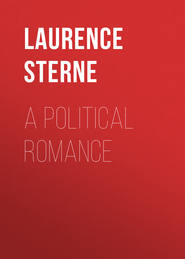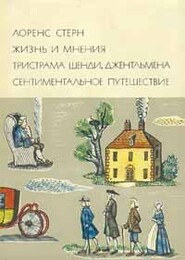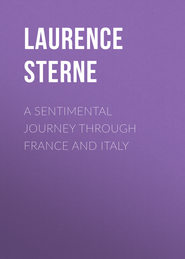По всем вопросам обращайтесь на: info@litportal.ru
(©) 2003-2025.
✖
The Life and Opinions of Tristram Shandy, Gentleman
Настройки чтения
Размер шрифта
Высота строк
Поля
Whilst my uncle Toby was whistling Lillabullero to my father,—Dr. Slop was stamping, and cursing and damning at Obadiah at a most dreadful rate,—it would have done your heart good, and cured you, Sir, for ever of the vile sin of swearing, to have heard him, I am determined therefore to relate the whole affair to you.
When Dr. Slop's maid delivered the green baize bag with her master's instruments in it, to Obadiah, she very sensibly exhorted him to put his head and one arm through the strings, and ride with it slung across his body: so undoing the bow-knot, to lengthen the strings for him, without any more ado, she helped him on with it. However, as this, in some measure, unguarded the mouth of the bag, lest any thing should bolt out in galloping back, at the speed Obadiah threatened, they consulted to take it off again: and in the great care and caution of their hearts, they had taken the two strings and tied them close (pursing up the mouth of the bag first) with half a dozen hard knots, each of which Obadiah, to make all safe, had twitched and drawn together with all the strength of his body.
This answered all that Obadiah and the maid intended; but was no remedy against some evils which neither he or she foresaw. The instruments, it seems, as tight as the bag was tied above, had so much room to play in it, towards the bottom (the shape of the bag being conical) that Obadiah could not make a trot of it, but with such a terrible jingle, what with the tire tete, forceps, and squirt, as would have been enough, had Hymen been taking a jaunt that way, to have frightened him out of the country; but when Obadiah accelerated his motion, and from a plain trot assayed to prick his coach-horse into a full gallop—by Heaven! Sir, the jingle was incredible.
As Obadiah had a wife and three children—the turpitude of fornication, and the many other political ill consequences of this jingling, never once entered his brain,—he had however his objection, which came home to himself, and weighed with him, as it has oft-times done with the greatest patriots.—'The poor fellow, Sir, was not able to hear himself whistle.'
Chapter 1.LII
As Obadiah loved wind-music preferably to all the instrumental music he carried with him,—he very considerately set his imagination to work, to contrive and to invent by what means he should put himself in a condition of enjoying it.
In all distresses (except musical) where small cords are wanted, nothing is so apt to enter a man's head as his hat-band:—the philosophy of this is so near the surface—I scorn to enter into it.
As Obadiah's was a mixed case—mark, Sirs,—I say, a mixed case; for it was obstetrical,—scrip-tical, squirtical, papistical—and as far as the coach-horse was concerned in it,—caballistical—and only partly musical;—Obadiah made no scruple of availing himself of the first expedient which offered; so taking hold of the bag and instruments, and griping them hard together with one hand, and with the finger and thumb of the other putting the end of the hat-band betwixt his teeth, and then slipping his hand down to the middle of it,—he tied and cross-tied them all fast together from one end to the other (as you would cord a trunk) with such a multiplicity of round-abouts and intricate cross turns, with a hard knot at every intersection or point where the strings met,—that Dr. Slop must have had three fifths of Job's patience at least to have unloosed them.—I think in my conscience, that had Nature been in one of her nimble moods, and in humour for such a contest—and she and Dr. Slop both fairly started together—there is no man living which had seen the bag with all that Obadiah had done to it,—and known likewise the great speed the Goddess can make when she thinks proper, who would have had the least doubt remaining in his mind—which of the two would have carried off the prize. My mother, Madam, had been delivered sooner than the green bag infallibly—at least by twenty knots.—Sport of small accidents, Tristram Shandy! that thou art, and ever will be! had that trial been for thee, and it was fifty to one but it had,—thy affairs had not been so depress'd—(at least by the depression of thy nose) as they have been; nor had the fortunes of thy house and the occasions of making them, which have so often presented themselves in the course of thy life, to thee, been so often, so vexatiously, so tamely, so irrecoverably abandoned—as thou hast been forced to leave them;—but 'tis over,—all but the account of 'em, which cannot be given to the curious till I am got out into the world.
End of the first volume.
THE LIFE AND OPINIONS OF TRISTRAM SHANDY, GENT.—VOLUME THE SECOND
Multitudinis imperitae non formido judicia, meis tamen, rogo, parcant opusculis—in quibus fuit propositi semper, a jocis ad seria, in seriis vicissim ad jocos transire.
Joan. Saresberiensis,
Episcopus Lugdun.
Chapter 2.I
Great wits jump: for the moment Dr. Slop cast his eyes upon his bag (which he had not done till the dispute with my uncle Toby about mid-wifery put him in mind of it)—the very same thought occurred.—'Tis God's mercy, quoth he (to himself) that Mrs. Shandy has had so bad a time of it,—else she might have been brought to bed seven times told, before one half of these knots could have got untied.—But here you must distinguish—the thought floated only in Dr. Slop's mind, without sail or ballast to it, as a simple proposition; millions of which, as your worship knows, are every day swimming quietly in the middle of the thin juice of a man's understanding, without being carried backwards or forwards, till some little gusts of passion or interest drive them to one side.
A sudden trampling in the room above, near my mother's bed, did the proposition the very service I am speaking of. By all that's unfortunate, quoth Dr. Slop, unless I make haste, the thing will actually befall me as it is.
Chapter 2.II
In the case of knots,—by which, in the first place, I would not be understood to mean slip-knots—because in the course of my life and opinions—my opinions concerning them will come in more properly when I mention the catastrophe of my great uncle Mr. Hammond Shandy,—a little man,—but of high fancy:—he rushed into the duke of Monmouth's affair:—nor, secondly, in this place, do I mean that particular species of knots called bow-knots;—there is so little address, or skill, or patience required in the unloosing them, that they are below my giving any opinion at all about them.—But by the knots I am speaking of, may it please your reverences to believe, that I mean good, honest, devilish tight, hard knots, made bona fide, as Obadiah made his;—in which there is no quibbling provision made by the duplication and return of the two ends of the strings thro' the annulus or noose made by the second implication of them—to get them slipp'd and undone by.—I hope you apprehend me.
In the case of these knots then, and of the several obstructions, which, may it please your reverences, such knots cast in our way in getting through life—every hasty man can whip out his pen-knife and cut through them.—'Tis wrong. Believe me, Sirs, the most virtuous way, and which both reason and conscience dictate—is to take our teeth or our fingers to them.—Dr. Slop had lost his teeth—his favourite instrument, by extracting in a wrong direction, or by some misapplication of it, unfortunately slipping, he had formerly, in a hard labour, knock'd out three of the best of them with the handle of it:—he tried his fingers—alas; the nails of his fingers and thumbs were cut close.—The duce take it! I can make nothing of it either way, cried Dr. Slop.—The trampling over head near my mother's bed-side increased.—Pox take the fellow! I shall never get the knots untied as long as I live.—My mother gave a groan.—Lend me your penknife—I must e'en cut the knots at last—pugh!—psha!—Lord! I have cut my thumb quite across to the very bone—curse the fellow—if there was not another man-midwife within fifty miles—I am undone for this bout—I wish the scoundrel hang'd—I wish he was shot—I wish all the devils in hell had him for a blockhead—!
My father had a great respect for Obadiah, and could not bear to hear him disposed of in such a manner—he had moreover some little respect for himself—and could as ill bear with the indignity offered to himself in it.
Had Dr. Slop cut any part about him, but his thumb—my father had pass'd it by—his prudence had triumphed: as it was, he was determined to have his revenge.
Small curses, Dr. Slop, upon great occasions, quoth my father (condoling with him first upon the accident) are but so much waste of our strength and soul's health to no manner of purpose.—I own it, replied Dr. Slop.—They are like sparrow-shot, quoth my uncle Toby (suspending his whistling) fired against a bastion.—They serve, continued my father, to stir the humours—but carry off none of their acrimony:—for my own part, I seldom swear or curse at all—I hold it bad—but if I fall into it by surprize, I generally retain so much presence of mind (right, quoth my uncle Toby) as to make it answer my purpose—that is, I swear on till I find myself easy. A wife and a just man however would always endeavour to proportion the vent given to these humours, not only to the degree of them stirring within himself—but to the size and ill intent of the offence upon which they are to fall.—'Injuries come only from the heart,'—quoth my uncle Toby. For this reason, continued my father, with the most Cervantick gravity, I have the greatest veneration in the world for that gentleman, who, in distrust of his own discretion in this point, sat down and composed (that is at his leisure) fit forms of swearing suitable to all cases, from the lowest to the highest provocation which could possibly happen to him—which forms being well considered by him, and such moreover as he could stand to, he kept them ever by him on the chimney-piece, within his reach, ready for use.—I never apprehended, replied Dr. Slop, that such a thing was ever thought of—much less executed. I beg your pardon, answered my father; I was reading, though not using, one of them to my brother Toby this morning, whilst he pour'd out the tea—'tis here upon the shelf over my head;—but if I remember right, 'tis too violent for a cut of the thumb.—Not at all, quoth Dr. Slop—the devil take the fellow.—Then, answered my father, 'Tis much at your service, Dr. Slop—on condition you will read it aloud;—so rising up and reaching down a form of excommunication of the church of Rome, a copy of which, my father (who was curious in his collections) had procured out of the leger-book of the church of Rochester, writ by Ernulphus the bishop—with a most affected seriousness of look and voice, which might have cajoled Ernulphus himself—he put it into Dr. Slop's hands.—Dr. Slop wrapt his thumb up in the corner of his handkerchief, and with a wry face, though without any suspicion, read aloud, as follows—my uncle Toby whistling Lillabullero as loud as he could all the time.
(As the geniuneness of the consultation of the Sorbonne upon the question of baptism, was doubted by some, and denied by others—'twas thought proper to print the original of this excommunication; for the copy of which Mr. Shandy returns thanks to the chapter clerk of the dean and chapter of Rochester.)
Chapter 2.III
Textus de Ecclesia Roffensi, per Ernulfum Episcopum.
Excommunicatio.
Ex auctoritate Dei omnipotentis, Patris, et Filij, et Spiritus Sancti, et sanctorum canonum, sanctaeque et entemeratae Virginis Dei genetricis Mariae,—
–Atque omnium coelestium virtutum, angelorum, archangelorum, thronorum, dominationum, potestatuum, cherubin ac seraphin, & sanctorum patriarchum, prophetarum, & omnium apolstolorum & evangelistarum, & sanctorum innocentum, qui in conspectu Agni soli digni inventi sunt canticum cantare novum, et sanctorum martyrum et sanctorum confessorum, et sanctarum virginum, atque omnium simul sanctorum et electorum Dei,—Excommunicamus,
et
vel
os s vel
os
anathematizamus hunc furem, vel hunc
Os
malefactorem, N.N. et a liminibus sanctae Dei ecclesiae sequestramus, et
aeternis
vel i n
suppliciis excruciandus, mancipetur, cum Dathan et Abiram, et cum his qui
dixerunt Domino Deo, Recede a nobis, scientiam viarum tuarum nolumus: et
ficut aqua ignis extinguatur lu- vel eorum
cerna ejus in secula seculorum nisi resque- n n
rit, et ad satisfactionem venerit. Amen.
os
Maledicat illum Deus Pater qui homi- os nem creavit. Maledicat illum Dei Filius qui pro homine passus est.
Maledicat
os
illum Spiritus Sanctus qui in baptismo ef-
os
fusus est. Maledicat illum sancta crux, quam Christus pro nostra salute
hostem triumphans ascendit.











